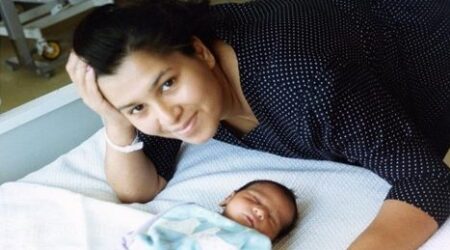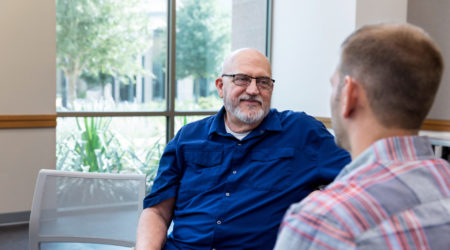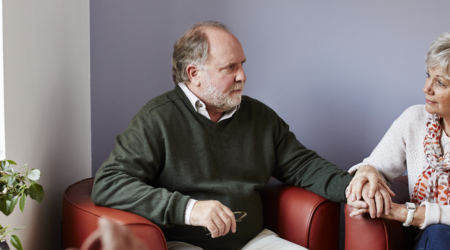Pancreatic cancer affects many different people, from those who are diagnosed, to the people who support them.
By sharing your own experience, your story may help raise vital awareness of the impact of pancreatic cancer on people’s lives or the symptoms of the disease. It could also inspire others to help raise funds to ensure our nurses can be there for those affected by pancreatic cancer now, and fund research that will enable us to detect early, treat better and transform care.
Sharing your story can provide some comfort to others affected by showing them that they’re not alone. It is also a way for you to feel heard and supported.
Fill out the form below to share your story
How will my story help?
Pancreatic cancer affects many different people, from those who are diagnosed, to the people who support them.
By sharing your own experience, your story may help raise vital awareness of the impact of pancreatic cancer on people’s lives or the symptoms of the disease. It could also inspire others to help raise funds to ensure our nurses can be there for those affected by pancreatic cancer now, and fund research that will enable us to detect early, treat better and transform care.
Sharing your story can provide some comfort to others affected by showing them that they’re not alone. It is also a way for you to feel heard and supported.
Where will Pancreatic Cancer UK share my story?
We use stories in many places. A few examples include our website, social media channels, e-newsletters, appeals, campaigns, and promotional materials. We may also use quotes from your story in materials such as information booklets.
When sharing stories with the media, we work with lots of different national and regional journalists across radio, TV, newspapers, magazines and online. Different journalists cover different types of stories so we only approach journalists who we think are appropriate for each story. Unfortunately, you can never predict what will happen in the news so we cannot guarantee your story will be published, but the vast majority do reach the public, helping to raise vital awareness of pancreatic cancer.
You are in control of the ways you would like us to share your story when you complete the submission form on this page.
What would I have to do?
If you’re happy to share your story, please fill out the form on this page. This includes a section asking you to tell us how pancreatic cancer has affected you and upload any photos you would like to include.
Once you have completed the submission form, we will confirm we have received it and our team will review your story. If an opportunity comes up, we will contact you using the details you have provided.
We cannot guarantee that every story will be shared by us, but we will securely store your story for future opportunities.
Sharing your story on our website
When sharing your story in the Real life stories section of our website, or through a blog post, our Information team will review it and may need to make some edits before it is published. We will share the story with you to make sure you are happy before we publish.
Our Communications team will do the same for other types of stories, for instance for our blog, newsletter or social media.
Sharing your story with the media
We may not have the right interview opportunity for you immediately. Different journalists are interested in different stories and the issues they choose to focus on can change over time. However, we’ll keep the details you provide us securely and will be in touch as soon as a suitable opportunity comes up.
If we have a media interview opportunity that might be right for you, one of our Media team will get in contact to find out more about your story and answer any questions you might have.
Our team will then speak to journalists and arrange an interview. Often this is over the phone, but if the journalist wants to take photos or film you, they may want to meet you in person. We will talk you through each opportunity, including the types of questions that the journalist may want to ask, and support you every step of the way.
What kind of stories are you looking for?
We are looking for stories that reflect the real experiences of people with pancreatic cancer and their families in the UK.
Every story and experience is unique. Our aim is to support everyone affected by pancreatic cancer, reaching all communities to raise awareness and provide support. Your story will help us to do that.
Unfortunately, we are not able to accept stories with no connection to the UK.
Do I have to share my name and photo?
The power in reading someone’s story is being able to relate to the storyteller, so we encourage you to provide your name and photo. We wouldn’t use your name without your consent.
When we share your story most of time, we’ll include your first name. A photo is great too as it helps us connect with more people and raise more awareness. If you prefer not to share a photo, you don’t have to include one. For our Real life stories section of the website, we also like to include your age.
Media
If you are sharing your story with the media, all journalists need to know your full name, age and to be able to include photos of you and/or your loved one in their story. Occasionally journalists may need to take their own photos or film footage, but we will talk you through this and support you.
Will I have a say over what is published?
We use stories in many places. A few examples include our website, social media channels, e-newsletters, appeals, campaigns, and promotional materials. We may also use quotes from your story in materials such as information booklets.
If you’re sharing your story on our website, our team will edit your story and send you the final draft for you to approve before we publish it. We will not publish your story until you are happy with the final version.
For stories shared with the media, neither you or Pancreatic Cancer UK will have final control over what the journalist says or writes. However, we will work closely with you and the journalist to make sure they have all the key facts. Before approaching journalists, our media team will talk to you and write up your story in your own words. Once you’ve had chance to review it and make any changes, the write-up of your story will be shared with the journalist to help them accurately convey your experience.
What happens next?
While we cannot guarantee that we will be able to feature every story that is submitted, we will let you know we have received it and discuss any current opportunities with you.
Sharing your story under Real life stories
If you have chosen to share your story under our Real life stories on our website, after you submit your form, our team will contact you within a few days. This will include checking some details and sharing any edits needed before publishing your story.
Sharing your story with the media
Whenever a suitable opportunity comes up to share your story with the media, one of our team will be in touch. They will then arrange an informal interview to capture the details of your story, and then speak to journalists to see if they would like to interview you.
How will I be supported?
Throughout the process, we will always support you and answer any questions you may have. From support on what to include in your story, to preparing for an interview with the media, we are here to make sure you feel comfortable sharing your story.
Can I change my mind?
If you change your mind after sharing your story, please tell us by emailing stories@pancreaticcancer.org.uk.
If your family member or friend sadly dies and you would like us to remove their story, we will do. Please contact us at stories@pancreaticcancer.org.uk.
If the story has already been shared with the media, in printed materials or on social media, it will not be possible to remove it entirely. However, if you do ask us to stop using your story, we will remove it from any document or platform within our control as soon as possible. We won’t use your story in any future materials.
Who can I contact?
If you have any questions about sharing your story, please send an email to stories@pancreaticcancer.org.uk and one of our team will be able to help.




